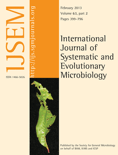
INTERNATIONAL JOURNAL OF SYSTEMATIC AND EVOLUTIONARY MICROBIOLOGY
metrics 2024
Unlocking the Secrets of Microbial Life
Introduction
International Journal of Systematic and Evolutionary Microbiology, published by the Microbiology Society, stands at the forefront of microbiological research, focusing on the systematic and evolutionary aspects of microorganisms. With its ISSN 1466-5026 and e-ISSN 1466-5034, this prestigious journal not only boasts an impressive impact within its fields—ranked Q1 in both Ecology, Evolution, Behavior and Systematics and Medicine (Miscellaneous), and Q2 in Microbiology for 2023—but also consistently provides an open access platform for researchers to disseminate their findings. Established in 2000, the journal has established itself as an essential resource for professionals and students alike, offering insights into microbial diversity, systematics, and evolutionary pathways. By providing a rich repository of knowledge with a global reach from its UK base, IJSEM continues to enhance our understanding of the microbial world, fostering collaboration and innovation in microbiological science.
Metrics 2024
 0.95
0.95 2.00
2.00 2.40
2.40 196
196Metrics History
Rank 2024
Scopus
IF (Web Of Science)
JCI (Web Of Science)
Quartile History
Similar Journals
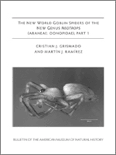
BULLETIN OF THE AMERICAN MUSEUM OF NATURAL HISTORY
Uncovering the wonders of nature through rigorous scholarship.BULLETIN OF THE AMERICAN MUSEUM OF NATURAL HISTORY, published by the American Museum of Natural History, represents a cornerstone of scholarly communication in the fields of Agricultural and Biological Sciences and Ecology. With an impressive impact factor highlighted by its Q1 quartile rankings in both categories, the journal publishes high-quality, peer-reviewed research that significantly contributes to the understanding of natural history. Researchers will find this journal indispensable as it covers a diverse range of topics, providing insights that drive ecological research and biological discovery forward. Although not open access, the Bulletin is widely available through institutional subscriptions, making it accessible to both established professionals and students eager to stay informed about the latest advancements in the field. Its commitment to advancing knowledge from 1996 to the present ensures that it remains relevant and highly regarded within the scientific community.
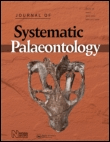
JOURNAL OF SYSTEMATIC PALAEONTOLOGY
Connecting the Past with Cutting-Edge ResearchJOURNAL OF SYSTEMATIC PALAEONTOLOGY, published by Taylor & Francis Ltd in the United Kingdom, stands as a premier platform for advancing the discipline of palaeontology. With an ISSN of 1477-2019 and an E-ISSN of 1478-0941, this journal has achieved an impressive ranking of Q1 within its category for the 2023 Scopus metrics, underscoring its significance in the field. Currently ranked #10 out of 113 in Earth and Planetary Sciences – Paleontology with a remarkable 91st percentile, it serves as an essential resource for researchers, professionals, and students alike. The journal aims to publish cutting-edge research that fosters a deeper understanding of systematic palaeontology, including the evolutionary relationships and biodiversity of extinct organisms. While it operates under a traditional access model, the Journal’s expansive reach from its inception in 2003 through to 2024 ensures it continues to play a vital role in shaping the future of palaeontological studies.
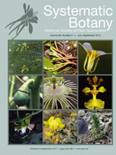
SYSTEMATIC BOTANY
Unveiling the Mysteries of Plant EvolutionSystematic Botany, published by the American Society of Plant Taxonomists, is an esteemed journal focusing on the diverse fields of plant taxonomy, systematics, and evolution. With an ISSN of 0363-6445 and an E-ISSN of 1548-2324, this journal serves as a critical platform for researchers aiming to advance our understanding of plant biodiversity and evolutionary relationships. Operating since 1994, Systematic Botany has garnered significant recognition, achieving a Q2 ranking in Ecology, Evolution, Behavior and Systematics, and Plant Science categories, and ranking within the top half of Scopus for Genetics. The journal prioritizes publishing high-quality, peer-reviewed research, making it an essential resource for academics, practitioners, and students alike. Although it does not provide open access options, the journal's robust reputation in both American and international botanical research speaks to its pivotal role in disseminating vital scientific knowledge in the field. For those interested in the latest advancements in plant science, Systematic Botany is indispensable.
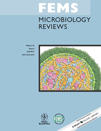
FEMS MICROBIOLOGY REVIEWS
Advancing Knowledge in Microbiology and BeyondFEMS Microbiology Reviews, published by Oxford University Press, is a leading journal in the field of microbiology, with a notable impact in related disciplines such as infectious diseases and medicine. Since its inception in 1989, this esteemed journal has grown to occupy a prestigious position, consistently ranking in the first quartile (Q1) in various categories, including Infectious Diseases, Medicine (miscellaneous), and Microbiology. With an impressive Scopus ranking of #13 in Microbiology and #25 in Infectious Diseases, it is recognized for its high-quality and impactful reviews that bridge the gap between fundamental microbiological research and practical applications. Aimed at researchers, professionals, and students alike, FEMS Microbiology Reviews offers critical insights and comprehensive analyses, making it an essential resource for those engaged in the dynamic study of microbial life and its implications for health and disease.
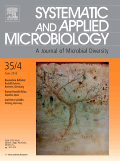
SYSTEMATIC AND APPLIED MICROBIOLOGY
Driving Discoveries in Applied Microbiology and EcologySYSTEMATIC AND APPLIED MICROBIOLOGY, with ISSN 0723-2020 and E-ISSN 1618-0984, is a prestigious journal published by Elsevier GmbH, located in Munich, Germany. Established in 1983, this journal provides a critical platform for the dissemination of high-quality research in the fields of applied microbiology, ecology, and biotechnology. With a commendable impact reflected in its 2023 Q1 ranking in Applied Microbiology and Biotechnology, and Ecology, Evolution, Behavior and Systematics, along with a Q2 ranking in Microbiology, SYSTEMATIC AND APPLIED MICROBIOLOGY maintains a high standard of scholarly excellence. As part of the Scopus database, it ranks prominently—79th out of 721 in Ecology, and within the top quartiles for its relevant fields, potent in disseminating implications for researchers, professionals, and students alike. Although it does not offer open access, the journal is dedicated to advancing knowledge and innovation in microbiological research, making it an essential resource for anyone in the field seeking to stay abreast of current findings and applications.

Malaysian Journal of Microbiology
Exploring the Microbial World: Research Without BordersMalaysian Journal of Microbiology is a prestigious open-access journal dedicated to advancing the field of microbiology, published by the Malaysian Society for Microbiology. Since its inception in 2005, this journal has become an essential platform for researchers and practitioners, facilitating the dissemination of innovative studies in applied microbiology, biotechnology, and infectious diseases. Based in Penang, Malaysia, this journal not only focuses on local microbiological research but also positions itself within the broader global scientific community. Although currently placed in the Q4 category in several relevant fields—including Applied Microbiology and Biotechnology, Infectious Diseases, and Medical Microbiology according to the 2023 Scopus rankings—it plays a crucial role in encouraging novel research and fostering collaboration among scientists. The journal encourages submissions that contribute to the understanding of microbial processes, disease mechanisms, and novel biotechnological applications, thereby supporting the continuous growth of knowledge in microbiology. With open access since its launch, the Malaysian Journal of Microbiology ensures that all published works are freely available to the public, enhancing their visibility and impact within the scientific community.

Myrmecological News
Advancing Myrmecology Through Innovative ResearchMyrmecological News is a premier open-access journal dedicated to the vibrant field of insect science, with a specific focus on the study of ants and their ecological significance. Published by the renowned Oesterreichische Gesellschaft Entomofaunistik in Vienna, Austria, this journal has been a crucial platform for researchers, professionals, and students alike since its inception in 2009. With a remarkable Q1 ranking in Insect Science and a commendable Scopus rank of 13 out of 181 (93rd percentile), it showcases high-quality research that advances our understanding of myrmecology. The journal not only emphasizes innovative methodologies and findings but also aims to foster interdisciplinary dialogue among scholars in related domains. Researchers can access a wealth of knowledge on ant behavior, ecology, and conservation strategies that are pivotal for biodiversity preservation. Please consider contributing to this vital body of work as we explore the multifaceted roles these fascinating insects play in our ecosystems.
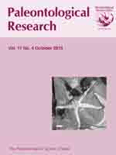
PALEONTOLOGICAL RESEARCH
Exploring the Depths of Life's History.PALEONTOLOGICAL RESEARCH, published by the PALAEONTOLOGICAL SOCIETY OF JAPAN, is a prominent peer-reviewed journal that addresses key developments in the field of paleontology, ecology, and evolutionary biology. With an ISSN of 1342-8144, this journal has established itself as a vital resource for researchers and professionals who seek to explore the intricate history of life on Earth, integrating insights into evolutionary dynamics and ecological frameworks. Operating since 1997 and with content converging up to 2023, PALEONTOLOGICAL RESEARCH occupies a notable position, ranked in the second quartile within both Ecology, Evolution, Behavior and Systematics and Paleontology categories. While it is not an open-access journal, its rich repository of studies significantly contributes to the academic community. Researchers and students engaged in the exploration of ancient ecosystems and their implications for current biodiversity are sure to find valuable insights within its pages, reinforcing the journal's importance as a leading platform for disseminating paleontological knowledge in Japan and beyond.
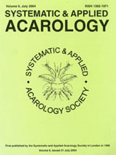
SYSTEMATIC AND APPLIED ACAROLOGY
Advancing acarology through innovative research.Systematic and Applied Acarology, with ISSN 1362-1971 and E-ISSN 2056-6069, is a leading international journal published by the Systematic & Applied Acarology Society in association with the esteemed Natural History Museum, London. This journal offers a vital platform for researchers in the fields of acarology, ecology, insect science, and evolutionary biology, boasting an impressive impact factor reflecting its significance, particularly with a Q1 ranking in Insect Science and Q2 rankings in Ecology and Evolution, Behavior and Systematics. The open access model ensures that groundbreaking research is readily accessible to a global audience, enhancing collaboration and knowledge sharing. With a scope that encompasses innovative studies, systematic methodologies, and applied acarology research, Systematic and Applied Acarology is committed to advancing the understanding of mite and tick biology, ecology, and their interactions within ecosystems. The journal continues to thrive as an essential resource for students, professionals, and researchers keen on pioneering studies in acarology, making impactful contributions to the scientific community.

ISME Communications
Unveiling Microbial Mysteries for Ecosystem SustainabilityISME Communications is an esteemed journal dedicated to advancing the field of environmental microbiology and its multifaceted intersections with ecology, biogeochemistry, and biotechnology. Published by SpringerNature, this journal aims to disseminate cutting-edge research and innovative insights that address pressing global challenges through interdisciplinary approaches. With a commitment to open access, it provides a platform for researchers, professionals, and students to share their findings widely, fostering collaboration and knowledge exchange. Although the journal is relatively new, its potential for impactful contributions is substantial, making it an essential resource for anyone interested in the microbial processes that underpin ecosystem functioning and sustainability. The journal not only prioritizes the rigorous peer-review process but also supports the academic community's pursuit of excellence in environmental science.